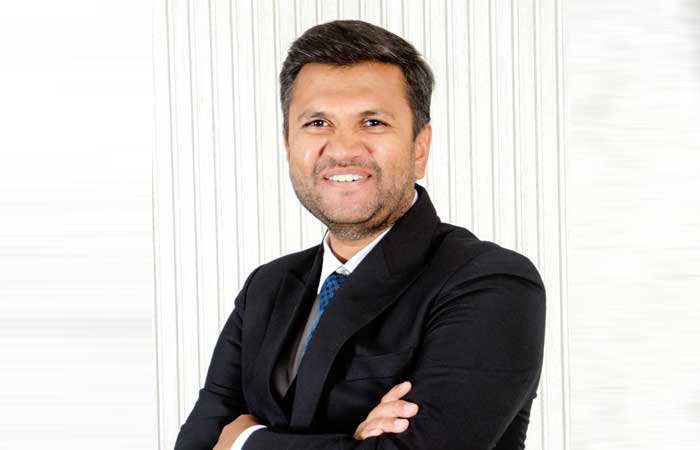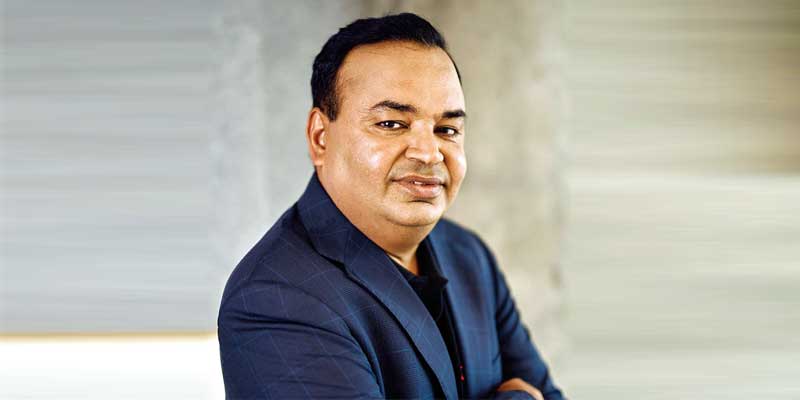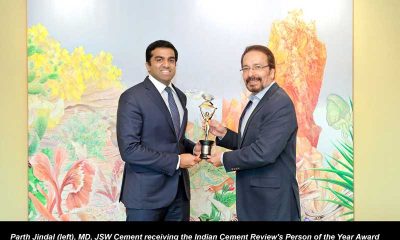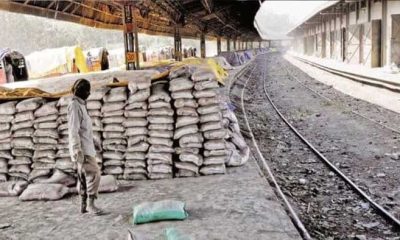Technology
The quest to reach the pinnacle in tech-based construction solutions
Published
12 years agoon
By
admin
Universal Construction Machinery & Equipment LtdThe Universal Group, an ISO-9001:2000 Company, is among India’s leading engineering conglomerates. A major player in construction and material handling equipment industry, Universal has emerged as a one- stop-shop for providing end-to-end solutions for the construction industry.The Universal Group, based in Pune, has emerged on the horizon as a one stop shop for providing end-to-end solutions for the construction and material handling equipment industry. Since three decades of emergence the Universal Group has become more than one of India’s largest engineering companies. It is a well known brand of excellence. It has pioneered new technologies, been a prime mover at every stage, introducing products and technologies which has helped the construction industry take a giant leap forward. Universal today stands in the league of premier corporate entities on the back of world class manufacturing practices coupled with a steadfast focus on research and development.A brief profileUniversal commenced operations in 1974 through the vision of Rohidas More, Chairman, Universal Construction, Machinery & Equipment Ltd, for creating a landmark in the field of construction equipment manufacturing. Its foray into business was marked by supplying oil lubricant pumps and gear boxes to major industrial giants. Since then, an eye for detail and expert execution has led Universal to achieve great heights. The company’s super triumph arrived when it created a nitric acid pump to be used in India’s combat weapon, the Prithvi Misslie. In 1982, the development of the Concrete Block Making Machine catapulted Rohidas More into the construction equipment manufacturing frame. The company achieved yet another milestone in the same year by exporting its products to Sri Lanka. The company is aiming at the global market now after achieving a pan India presence under the second generation entrepreneurship of Ranjit More, Managing Director, Universal Construction, Machinery & Equipment Ltd. The company aims to achieve this by making construction processes simple, technically excellent and economically viable. The company’s professional expertise is fine tuned to world class standards and can be seen in a spectrum of applications such as Painting & Repairs of Exterior Building Glass I Aluminum Cladding, External Plastering 8. Brick work, Chimneys, Hoarding / Shipyard Maintenance, External Building Maintenance etc. The company has state of the art manufacturing units equipped with advanced machineries. The company’s R&D wing constantly aims at creating advanced technology. Using world class software such as Sold Edge and SCADA, the company’s engineers design innovative machines which are time saving, cost efficient and safe.State of the art plantsUNIVERSAL commissioned the Rudrapur Plant in February 2010, in order to cater to the growing demand from the northern and the North – eastern of India.The plant is sprawling over a vast industrial area in Uttarakhand and is ideally located at 250 kms. from Delhi.The plant is self-sufficient and well equipped with all modern machinery comprising ol CNC and advanced material handling equipment. It is all set to manufacture the entire range ot products from the Universal bouquet.We have state – of – the -art Plazma Cutting CNC machine for mechanized expertise at our Rudrapur Plant. Here, we have a large, state-of – the – art manufacturing facility .Our Testing & Quality Assurance Facility keeps up to the promise of 100 percent quality deliverables. Universal also boasts of Advanced Machinery.LARGEST MANUFACTURING FACILITIESPoona Construction Machinery’s Shindewadi Plant is the largest manufacturing facility exclusively engaged into development of ancillaries for the company.It covers products under SBU I which are the 10/7 Concrete Mixer Series, Basic Vertical Material Handling Solutions, Bar Processing Solutions, Block Laying Machines, Sand Processing Machines. Ground Campaction Solutions & also the Laboratory Testing Solutions.Additionally it covers SBU l which includes Vertical Material Handling Solutions for high rised structures & their maintenance. Thirdly it covers the Tough Rider. The state -of – the -art facilities here combined with highly skilled work – force and competent engineers make this plant the largest manufacturer in quality construction equipments.The Shindewadi Plant has a huge & multi – facility state of the art setup with extremely high precision, advanced machines including an ultra modern Paint Booth.THE ‘MEGA PROJECT’Founded in the year 2006, this the company’s Shivare facility at Pune covers a range of advanced manufacturing process equipment. The CIDC- affiliated Training Centre (UCMTC) & library lend it a unique status.The Shivare Plant has been a trendsetter in the construction equipment manufacturing sector. With its mammoth size and world class machinery & facilities, it caters to western and southern India.It covers products under SBU ll which includes the FIM series B as well as the batching plants based on the FIM Technology. Additionally it includes the on wheel pan, the in line stationary batching plants and the Transit Mixer.The company has a state – of – the – art Plazma Cutting CNC machine for mechanized expertise. In the CIDC Training Centre the employees are geared up to operate machinery. The library has an updated study material for engineers, technicians and operators. There is a showroom for the company’s prospective customers to get a first hand feel of our products.A full fledged R & D Department makes sure that newer innovations are brought to use to produce quality equipments. Our Testing & Duality Assurance Facility keeps up to the promise of 100 percent quality deliverable. Universal also boasts of Advanced Machinery. Commenting on the R&D efforts by the company Mr Ranjit More, Managing Director replied, "during 2010-11, Rs 5 crores was spent on R&D activities. The expenditure has now been augmented to Rs 10 crores. Our R&D centre is one of the few in the country to be certified by the Government of India."Unique InitiativeThe company has always believed that it is imperative to explore new approaches in order to strengthen relationships with the construction fraternity as well as its existing and potential customers. As part of this initiative, Universal is launching the Construction Equipment Park, the first of its kind in India. To be located at the company’s Shivare campus, it will hold a permanent exhibition where the entire construction equipment range of products will be on display. Visitors to the park will also be able to watch the demonstration of the latest additions to the company’s range of equipment. The uniqueness of the whole endeavor will lie in the experience of the visitors actually operating them. The facility will be a boon for builders, architects, construction engineers and trainees for enhancing their technical capabilities.Universal has always excelled at exploring newer approaches for developing relationships with the construction fraternity as well as its existing and potential customers. Exercising yet another unique and path-breaking idea, Universal is launching Construction Equipment Park, a first of its kind in India.The Park at its Shivare campus holds a permanent exhibition where Universal’s entire construction equipment range of products will be on display. Visitors to this park will be able to watch the demonstration of the latest additions to the Universal range to equipment. They will also be able to experience their wonderful facets by operating them.The facility will be extremely useful for builders, architects, construction engineers and trainees, as it will enhance their technical capabilities.Global ReachIn order to take its products and solutions global, Universal Construction Machinery & Equipment Ltd has signed a Supply and International distribution agreement with Tata International Ltd (TIL). Universal’s products will be exclusively distributed and marketed in over 55 countries in the international market by TIL, which is the international trading arm of the Tata Group. Commenting at length on this partnership Mr Rohidas More, Chairman stated, "We planned to strategise our operations in a global manner in 2010 through a tie up with the Tatas, one of India’s largest industrial conglomerates. This has enabled us to compete effectively with European and Chinese competitors. We further plan to expand our footprint in the Middle East, Africa and South East Asian countries." This partnership deal enables Universal to explore the potential in international markets for its flagship products like Reversible Mixers, Transit Mixers and Batching Plants. Centralized distribution hubs will be set up in overseas locations by Universal and TIL for tapping the OEM (Original Equipment Manufacturer) potential and reduce effective costs in the process. The combine will engage in an aggressive penetration of the two emerging economies of Brazil and Russia. The new trading facility will also concentrate on departmental buying as institutional sales have a huge potential.VisionThe company aims at satisfying each of its customer beyond the expected levels of business excellence through providing innovative, world-class construction equipments supported by technically competent serving capabilities. The company aims at becoming the largest selling construction manufacturing company by adhering to world class standards through strong R&D efforts, sophisticated manufacturing equipment and strong after sales support. The company wants to create a future for stake holders and employees while guaranteeing 100 percent customer satisfaction.Commenting on the initiatives taken by the company to ensure customer satisfaction, K.K.Taparia, Deputy Managing Director, Universal Construction Machinery & Equipment stated, "the challenges before us lie in offering cost effective solutions and the right size concrete machines. We also plan to develop small batch plants which can be deployed at site. The consumer is interested in purchasing different types of small equipment having dual advantages of low cost and high speed." He further stated, "We have a state of the art Research & Development Center and we are in the process of getting various equipments standardized by us through the Bureau of Indian Standards (BIS), which is the need of the industry."Taking into account the rising production costs, the company has introduced several efficient mechanisms in their production systems. The company has started utilizing PVC covers, panels in place of steel as PVC is much cheaper than steel. The use of PVC is also advantageous in the fact that PVC does not get corroded like steel.The company has also launched a 20 year long business strategy to strengthen its presence. It has embarked on its 4th business plan in 2011 which will end in 2016. A vital part of this plan involves appointing 75 dealers at 250 different locations across the country. This strategy is expected to help the company in the mid and long range term.Conclusion.With a fast growing construction market and an increased expenditure on infrastructure by the government, the construction machinery industry seems to be right on track to take advantage of the situation. Universal Construction Machinery& Equipment Ltd with its adherence to strict quality standards and ensuring customer satisfaction seems poised to retain its front lead position as a leader in the construction equipment industry
Economy & Market
We are shaping the future of clean air
Published
2 days agoon
April 16, 2024By
admin
Monil Parikh, Managing Director, Techflow Enterprises Pvt Ltd, leads us to a better understanding of how cutting-edge designs and advanced technologies are revolutionising the process of filtration, driving efficiency and environmental responsibility within the cement sector.
Tell us about your air pollution control systems.
Techflow Enterprises, operating from our expansive 30,000 sq m facility, which is one of India’s largest, manufactures a comprehensive suite of air pollution control systems specifically designed for cement plants. Our solutions include:
Pulse Jet Bag Filters: Employing compressed air for efficient cleaning, these capture fine dust particles generated during grinding and packing. Techflow’s bag filters are designed to restrict the outlet emission up to 5mg/Nm3.
Electrostatic Precipitators (ESPs): Ideal for ultra-fine particulate matter in kiln exhaust gases, ESPs utilise an electric field for superior dust capture with 99.9 per cent capacity.
Centrifugal Fans: We offer various fans like induced draft (ID) fans for draft creation, process fans for dust-laden air transport, and kiln fans for high-temperature gas streams.
Techflow’s commitment to quality is evident in our proven track record. We are actively supplying solutions to leading cement players like Adani Cements, Ambuja and ACC Cement, Dalmia Bharat Cement and Wonder Cement. Our installations across India and Asia stand as a testament to our expertise in handling cement plant dust control challenges.
How do your products and systems integrate with cement plants?
Techflow’s air pollution control systems seamlessly integrate into your existing cement plant. Our pulse jet bag filters fit effortlessly downstream of grinding mills and packing stations, effectively capturing fine dust particles generated during these processes. Electrostatic Precipitators (ESPs) excel in kiln exit gas streams, working alongside existing cyclones to achieve ultra-fine particulate control, a critical step in maintaining clean air emissions.
Techflow’s comprehensive offering of centrifugal fans ensures a perfect fit for any application. Our ID fans seamlessly integrate into the kiln system, creating the necessary draft to pull exhaust gases through the air pollution control equipment. Process fans, strategically placed throughout the plant, efficiently convey dust-laden air from various generation points, like clinker coolers and raw material handling, towards the filtration units. This modular approach minimises disruption during installation and ensures optimal dust collection across your entire cement production process.
How do your innovative designs better the process of filtration at cement plants bringing efficiency to the process?
Techflow’s commitment to innovation translates to superior filtration efficiency and operational cost savings for cement plants. Our pulse jet bag filters incorporate features like:
- High-efficiency filter media: Designed for specific dust types, this media minimises pressure drop across the filter, reducing energy consumption.
- Improved flue gas entry design
- Low Pressure Cleaning Systems
- Optimised pulse cleaning systems: These systems efficiently dislodge dust cake buildup using compressed air, maximising filter media life, and minimising downtime.
Our ESPs utilise advanced electrode designs to enhance particle collection and reduce maintenance intervals. Furthermore, Techflow’s centrifugal fans are meticulously crafted for superior aerodynamic performance, leading to lower energy consumption and improved overall plant efficiency.
Techflow has developed a SMART-LINK automation module for better maintenance and real-time remote tracking of performance of each equipment. Cement plants equipped with Techflow’s systems experience reduced operational costs, minimised downtime and compliance with ever-evolving environmental regulations.
What is the key differentiator between traditional filters and modern filters?
Traditional bag filter systems often relied on manual cleaning methods, leading to inconsistent performance, increased downtime, and potential worker exposure to dust. Modern pulse jet bag filters, like those offered by Techflow, address these limitations.
Our systems leverage automated cleaning mechanisms, ensuring consistent filtration efficiency and minimal operator intervention. Additionally, advanced filter media materials in Techflow’s bag filters offer superior dust capture capabilities compared to traditional fabric filters.
This commitment to modern technology translates to a safer and more efficient and environmentally friendly dust control solution for cement plants.
Can your designs be customised as per the requirement of the customers?
At Techflow, we understand that every cement plant has unique dust control requirements. That is why we prioritise customisation across our entire product range:
Pulse Jet Bag Filters: Filter media type and micron rating based on dust properties, number of filter bags, and pulse cleaning system configuration like cycle time and pressure can all be adjusted to optimise performance for your specific dust and airflow. The system can be designed to achieve less than 5mg/Nm3 outlet emission standards as well.
- Electrostatic Precipitators (ESP): ESP design can be customised with features like the number of electrode rows, electrode spacing, and power input like voltage and current to achieve the desired dust collection efficiency for your specific outlet emission capacity less than 20mg/Nm3.
- Centrifugal Fans: Fan designs are tailored by adjusting factors like impeller diameter, blade design, and motor size to meet the specific pressure and flow requirements of various processes within a cement plant.
This focus on customisation ensures Techflow’s air pollution control systems perfectly match your cement plant’s needs, guaranteeing optimal dust capture and efficient operation.
What is the role of technology and automation in building filtration systems?
Techflow has designed a SMART-LINK System that can be integrated to our equipment which tracks and monitors performance of equipment in real time.
- Continuous diagnostics
- Condition-based maintenance
- Prevention of unplanned downtime
- Early problem detection using AI
- Data collection for process optimisation and efficiency maximisation
- Auto alert with warning driving timely human interactions
- Remote maintenance assistance by Techflow Team.
What are the major challenges in the filtration process and your system integration at cement plants?
The cement industry’s focus on sustainability, higher production and diverse fuel sources creates filtration hurdles. Adapting to changing dust properties, handling increased dust loads, and integrating seamlessly within space constraints are key challenges.
Techflow tackles these issues through advanced design techniques, exploration of innovative filter media, and modular system design. This ensures our filtration systems remain adaptable, efficient and seamlessly integrated within your cement plant, empowering your success.
How do you plan to further better your products and bring innovation in the future?
At Techflow, we are not just building filtration systems, we are shaping the future of clean air in the Indian cement industry. After successful expansion of the manufacturing facility in 2023, now it is time to improve designs and process optimisation. The future holds exciting possibilities: next-generation filter media with self-cleaning properties and
extended lifespans, minimising maintenance and maximising efficiency.
Techflow’s legendary after-sales support is about to get even better. We are expanding our global service network to provide you with 24/7 access to a team of India’s most experienced filtration specialists, ensuring your system operates flawlessly throughout its lifecycle.
Together, we will lead the way towards a sustainable future, paving the path for a greener tomorrow with green cement.
- –Kanika Mathur
Economy & Market
Digitalisation is changing the logistics landscape
Published
2 days agoon
April 16, 2024By
admin
Haresh Calcuttawala, CEO and Co-Founder, Trezix, explains how their platform streamlines export processes, optimises logistics operations, and addresses the challenges faced by the cement industry.
How does your platform help in the compliance of cement exports?
The Trezix platform helps with the end-to-end processes for exporters, ensuring complete visibility of these processes focusing on shipments, documents, compliances, etc. The platform is also integrated with various stakeholders’ part of the export process including integration with Unified Logistics Integration Platform (ULIP) by the Government of India.
What is the impact of your systems on the cost and productivity of a cement plant?
The Trezix platform helps to optimise the turnaround time, visibility of shipment and improving efficiencies, which results in optimisation in logistics cost and improvement in working capital.
What are the major challenges in logistics and how can that be resolved?
A major challenge in the cement industry is the logistics cost and time for delivery. This can only be resolved with faster turnaround time, complete visibility of shipments, delivery lead time and process control to adhere to compliance.
Tell us your views on the change technology is bringing to logistics.
In the cement industry, so far technology has been more focused on internal process, and optimising demand and supply in the area of supply chain. However, now the focus has completely shifted to external stakeholders and their processes, and how have we integrated processes to further optimise the logistics execution.
Can your systems and solutions be customised based on customer requirements?
Every customer has some unique value proposition for their customer segment. Trezix has flexibility by way of configuration to adhere to industry needs and specific customer needs, keeping in mind the regulatory processes are not deviated to fulfil statutory requirements.
How do you foresee the face of logistics changing for the cement industry?
Digitalisation is one of the biggest waves you can see in the logistics space, which is changing the face of the industry. Digitalisation is changing the logistics landscape. Various concepts like Just In Time (JIT) to customer delivery are now a reality. Vehicle utilisation, fuel efficiency, delivery visibility, vehicle tracking through RFID, Fastag, FOIS (rail receipt tracking), container/cargo tracking across geography is now a reality.
- –Kanika Mathur

Ankit Kumar, Co-Founder and CEO, Skye Air, highlights the advantages of drone deliveries for the cement industry to improve the overall operational efficiency and cost-effectiveness of the supply chain.
What is the environmental impact that drone deliveries can create?
Drone deliveries have the potential to significantly reduce environmental impact compared to conventional delivery methods. By utilising drones, the carbon footprint of last-mile delivery can be slashed by eliminating the need for vehicles and vans, which emit greenhouse gases during transport. In fact, studies have shown that drone deliveries can reduce carbon emissions by up to 80 per cent compared to traditional delivery methods. Additionally, drones provide more direct routes, minimising congestion and further lowering emissions.
Furthermore, Skye Air’s implementation of drone technology can contribute to a substantial decrease in air pollution. Traditional delivery vehicles, powered by fossil fuels, contribute significantly to air pollution, whereas drones operate on cleaner energy sources, such as electricity. As a result, the adoption of drone technology by Skye Air could lead to a notable reduction in harmful pollutants released into the atmosphere.
It’s worth noting that Skye Air is committed to continuous monitoring and optimisation of its operations to ensure that the environmental benefits of drone delivery are maximised. Through data-driven analysis and innovative strategies, Skye Air aims to further enhance the efficiency and sustainability of its drone delivery services.
In conclusion, while drone deliveries offer significant environmental benefits, rigorous management and innovation are essential to mitigate any potential negative effects and ensure the long-term viability of drone delivery operations.
Tell us about the efficiency created by drone delivery systems.
Skye Air has spearheaded a paradigm shift in the logistics industry by substantially augmenting efficiency in their drone deliveries. Drones can help circumvent traditional road networks, bypass traffic congestion and surmount logistical impediments, facilitating expeditious and direct transportation of goods. This heightened efficiency is particularly conspicuous in exigent circumstances, such as the delivery of medical supplies to remote regions or the expeditious fulfillment of urgent orders. By harnessing the capabilities of drones, Skye Air optimises delivery routes, curtails fuel consumption, and mitigates the overall operational costs inherent in conventional delivery methodologies.
Indeed, empirical data underscores the efficacy of drone deliveries, showcasing a significant reduction in delivery times by up to 50 per cent compared to traditional methods. Moreover, drone deliveries have been shown to minimise fuel usage by approximately 60 per cent, contributing to substantial environmental conservation efforts.
Furthermore, the automation of the delivery process not only expedites operations but also bolsters efficiency, resulting in enhanced customer satisfaction rates. With streamlined processes and expedited turnaround times, Skye Air sets a new standard for excellence in the logistics domain.
What is the role of digitalisation and technology in your delivery and transport system?
In Skye Air, digitalisation and technology serve as pivotal catalysts in revolutionising our delivery and transport system. Through the integration of cutting-edge drone technology like Skye UTM, we have established a streamlined and efficient delivery process. Our drones are equipped with state-of-the-art navigation systems and sensors, enabling precise and secure delivery routes. Skye UTM stands as the most advanced and indigenised Aerial Traffic Management platform, designed to furnish situational awareness, autonomous navigation, risk assessment, and traffic management to all drone and aerial mobility operators across the airspace. Skye UTM has already facilitated successful BVLOS (Beyond Visual Line of Sight) drone flights. The Skye UTM captures over 255+ parameters of UAV movements, storing them in its ‘Black box’, which comprises a published systematic description of the entire flight. This platform offers the inaugural 3-Dimensional view of the drone airspace, alongside operations and regulations mapping servers, furnishing the latest airspace status, verified paths, and exhibiting real-time UAV movements. Furthermore, our digital platforms empower customers to seamlessly place orders and track their deliveries in real-time. This digitalisation not only amplifies the velocity and precision of our deliveries but also ensures transparency and accountability throughout the entire process.
Can drone deliveries be incorporated with the cement industry in the future?
In the foreseeable future, the incorporation of drone deliveries holds promise for integration within the cement industry, presenting efficient and swift transportation solutions for materials. The sophisticated drone technology prevalent in logistics stands poised to collaborate seamlessly with cement companies, optimising their supply chain operations. Drones can ferry small batches of cement or other construction materials to remote or challenging-to-access locations, thereby diminishing reliance on conventional transportation modes such as trucks and mitigating logistical complexities. Through the strategic utilisation of drones, the cement industry stands to bolster its efficiency, curtail costs and elevate overall operational efficacy.
- –Kanika Mathur

RAHSTA will drive road construction innovation: Sundaresan

New appointment at TMEIC

Social Impact Award for Ambuja Cements

UCWL unveils new plant in Dabok, Udaipur

Ambuja Cement hosts ‘Watershed’ event

Environment Ministry revises rules of solid waste management

M-sand boards new terrain

Process and quality optimization in cement plant.
Concrete: A Highly Sustainable Building Material












